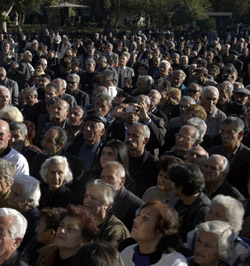The propaganda for the constitutional amendments referendum has already made some errors. The most important one is that there is no television airtime provided for those who are against the amendments (or is partly provided). Besides that, different authority loops are trying to create obstacles for the opposition to not meet with the people in regions.
It is evident that the authorities are striving to get the “yes” from the people for the referendum. They are planning out everything so that violations go on before the referendum and so everything goes “smoothly” on November 27 when international observers come.
Why do the authorities want to pass the constitutional amendments in the first place? No matter how strange it may sound, nobody has found a convincing answer to this question. The answers given by the “yes” propagandists, claiming that “the constitutional amendments help us take a big step towards European integration and will help Armenia progress” are not so convincing. If the authorities really needed that “progress”, then how come they were delaying the referendum for months until finally they gave way to the Venetian convention which kept them under pressure? What’s also not convincing is how the oppositionists claim that the main reason for the constitutional amendments is to keep Kocharyan untouchable. No matter what happens, Kocharyan will remain untouchable as long as he is still president. After his presidential term is over, one way or another, there will be legalities to turn that “untouchable” clause around.
But seriously, why are the authorities striving to snatch the “yes” from the people? Imagine this scenario: all political forces have equal opportunities to carry out propaganda, no shady mechanisms are applied, an ideal referendum takes place and the constitutional amendments do not pass. What do you think-will the European Union then punish Armenia? Will the EU declare that Armenia does not correspond to Europe’s democratic norms? Not at all. On the contrary, Kocharyan will feel proud that Armenia is so democratic that even the authorities’ efforts could not help pass the constitutional amendments.
Why don’t the authorities take this path? The answer is simple: if the constitutional amendments do not pass, then the opposition will immediately declare that the “no” to the amendments is a “no” to the authorities and there will be thousands of gatherings demanding the president to resign. The authorities, in their turn, will use their barbed wires, water-spraying equipment, battues, etc. Basically, Armenia will once again be considered as one of the non-democratic countries and president Kocharyan as the “authoritarian leader.”
This is why the authorities prefer to violate democratic norms in “small doses” before the international observers arrive to Armenia. If the opposite happens, they will be forced to do that in “large doses” and in front of international observers.
Almost the same scenario is taking place in Azerbaijan. The only difference here is that the issue of the authorities is more concrete (Azerbaijan is not solving the issue concerning the Constitution, but rather, the parliament). Aliyev has started repressions beforehand and plans on winning over the opposition until the elections (so that everything goes “smoothly” on November 6). The problem is that Aliyev is in a tougher situation and will be forced to take desperate measures. Meanwhile, international structures will be forced to maintain the stability of Armenia and Azerbaijan. Basically, they will be forced to announce that democracy in both countries is at the same level. This means that Armenia’s constitutional amendments referendum process will be highly dependent on the Azeri parliamentary elections and the events that follow.

